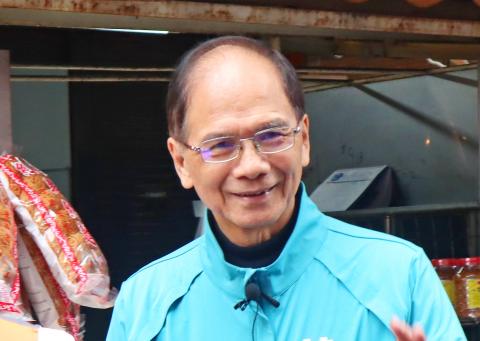With new legislators to be sworn in on Feb. 1, former premier Yu Shyi-kun, who is to take a legislator-at-large seat, is seen by Democratic Progressive Party (DPP) members as a popular candidate for legislative speaker.
The DPP on Saturday maintained its majority in the Legislative Yuan, winning 61 seats, four more than the 57 needed to claim the majority in the 113-seat legislature.
While the Chinese Nationalist Party (KMT) won 38 seats, there are smaller parties and independents with a similar ideologies that the DPP can count on if it needs additional votes on legislation.

Photo: Chou Hsiang-yun, Taipei Times
The New Power Party maintained its presence with three seats and the Taiwan Statebuilding Party took one seat, while four of the five independents voted in belong to the pan-green camp.
DPP Legislator Chen Ou-po (陳歐珀) was the first to express support for Yu.
As Yu has a well-rounded political resume, is good at mediating and has made a steadfast effort to make Taiwan a normalized country, he is the best candidate for legislative speaker, Chen said yesterday.
Yu should also be given credit for the DPP’s outstanding legislative election results, as he traveled the nation stumping for the party’s legislative candidates, he added.
Meanwhile, DPP Legislator Chen Ming-wen (陳明文), who in 2016 expressed an interest in running for legislative speaker, said he was waiting for DPP legislators to come to a consensus on who to support.
He said that he would respect the decision of the DPP caucus.
DPP caucus whip Ker Chien-ming (柯建銘), another potential candidate, said that a stable legislature that allows parties to function normally is crucial to the nation’s development.
He said he would respect the president’s strategic personnel planning, as well as any consensus reached by caucus members.
In response to media queries, Deputy Legislative Speaker Tsai Chi-chang (蔡其昌) said that Yu seemed like a fitting choice given his experience and stature in the DPP, but he believes that DPP members’ opinions should be consulted before a conclusion is reached.
Asked if he would vie for the legislative speaker seat, Tsai said he has no such plans and would focus on his current duties.
Additional reporting by CNA

The Ministry of Education (MOE) is to launch a new program to encourage international students to stay in Taiwan and explore job opportunities here after graduation, Deputy Minister of Education Yeh Ping-cheng (葉丙成) said on Friday. The government would provide full scholarships for international students to further their studies for two years in Taiwan, so those who want to pursue a master’s degree can consider applying for the program, he said. The fields included are science, technology, engineering, mathematics, semiconductors and finance, Yeh added. The program, called “Intense 2+2,” would also assist international students who completed the two years of further studies in

Former president Tsai Ing-wen (蔡英文) departed for Europe on Friday night, with planned stops in Lithuania and Denmark. Tsai arrived at Taiwan Taoyuan International Airport on Friday night, but did not speak to reporters before departing. Tsai wrote on social media later that the purpose of the trip was to reaffirm the commitment of Taiwanese to working with democratic allies to promote regional security and stability, upholding freedom and democracy, and defending their homeland. She also expressed hope that through joint efforts, Taiwan and Europe would continue to be partners building up economic resilience on the global stage. The former president was to first

Former president Tsai Ing-wen (蔡英文) on Monday called for greater cooperation between Taiwan, Lithuania and the EU to counter threats to information security, including attacks on undersea cables and other critical infrastructure. In a speech at Vilnius University in the Lithuanian capital, Tsai highlighted recent incidents in which vital undersea cables — essential for cross-border data transmission — were severed in the Taiwan Strait and the Baltic Sea over the past year. Taiwanese authorities suspect Chinese sabotage in the incidents near Taiwan’s waters, while EU leaders have said Russia is the likely culprit behind similar breaches in the Baltic. “Taiwan and our European

The Taipei District Court sentenced babysitters Liu Tsai-hsuan (劉彩萱) and Liu Jou-lin (劉若琳) to life and 18 years in prison respectively today for causing the death of a one-year-old boy in December 2023. The Taipei District Prosecutors’ Office said that Liu Tsai-hsuan was entrusted with the care of a one-year-old boy, nicknamed Kai Kai (剴剴), in August 2023 by the Child Welfare League Foundation. From Sept. 1 to Dec. 23 that year, she and her sister Liu Jou-lin allegedly committed acts of abuse against the boy, who was rushed to the hospital with severe injuries on Dec. 24, 2023, but did not